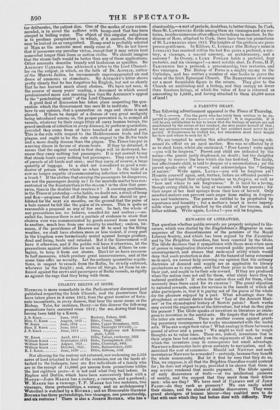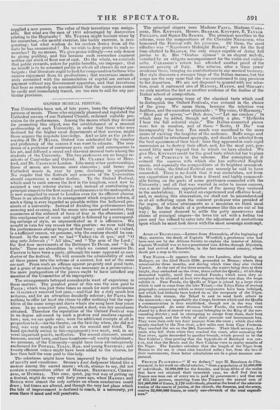REWARDS OF LITERATURE.
THE question whether public rewards are properly assigned to lite- rature, which was started by the Englishman's Magazine in con- sequence of the discontinuance of the pensions of the Royal Literary Society, and which has been argued by the Examiner and by the Brighton Guardian, has been renewed by the Globe. The Globe declares that it sympathizes with those wras when men of genius in imaginative literature received public protection and encouragement, and abuses that mole-eyed utility which would deny that such protection is due. At the hazard of being esteemed mole-eyed, we cannot help avowing our opinion that the ordinary doctrines of demand and supply are as applicable to literary productions as to any other, and that their price in the market is their just, and ought to be their sole reward. If they are produced when the nation does not call for them, what claim have they to national gratitude ? If when the nation does call for them, what necessity does there exist for its exercise ? The grand objection to national rewards, unless for services in the benefit of which all alike participate, is, that it is paying out of the purse of the whole for the pleasure enjoyed by a part. What advantage does the ploughman or artisan derive from the "Lay of the Ancient Mari- ner" or the etymological history of Scotch patois ? Such works may extend the enjoyments of the litterateur, but what do they give the peasant ? The Globe speaks of invention in literature as anala- gous to invention in the useful arts. He forgets that the effects of the latter are universal. There is another reason against grant- ing pecuniary recompenses for works unconnected with the useful arts. Who can assign their value ? What analogy is there between a pound of silver and a poem ? We might as well seek to weigh thoughts as to value lines. There are, indeed, inventions that in their origin bear but remotely on the enjoyments of life, and from which the inventors reap in consequence but small advantage. NEWTON.S discoveries have given certainty to navigation, and di- minished the cost of commerce. Should not NEWTON and such inventors as NEWTON be rewarded? — certainly, because they benefit the whole community. But let it first be seen that they do so. This, we suppose, is all that the Brighton Guardian would contend for ; he does not object to pay, provided it be shown that there is any service rendered that merits payment. The Globe speaks of early discoverers of truth— of the intellectual pioneers of society, and the support that they merit from their fellow men : who are they? We have read of CAnmus and of Joiirr FAUST—do they rank as pioneers? We can easily admit their claims, and the claims of similar discoverers. They were grand abridgers of human labour—they enabled men to do that with ease which they had before done with difficulty. They supplied a new power. The value of their inventions was assign- able. But what are the men of 1831 advantaged by discoveries relating to the Heptarchy? Mr. TURNER might become wiser by his researches,—for mental exercise, like bodily exercise, is invi- gorating; but what wisdom do his readers derive from all the facts he has enumerated ? Do we wish to deny praise to such re- searches? By no means. We give praise willingly—we only demur to giving pudding, and this because such researches augment neither our stock of flour nor of suet. On the whole, we conclude that public rewards, unless for public benefits, are improper ; that no benefit is to be esteemed public in wIrch all classes do not par- ticipate; that literature ought to look for compensation tothose who receive enjoyment from its productions ; that inventions immedi- ately connected with the accumulation of capital are certain of payment without any Government apparatus, and that inventions that bear so remotely on accumulation that the connexion cannot be easily and immediately traced, are too rare to call for any par- ticular provision.



























 Previous page
Previous page